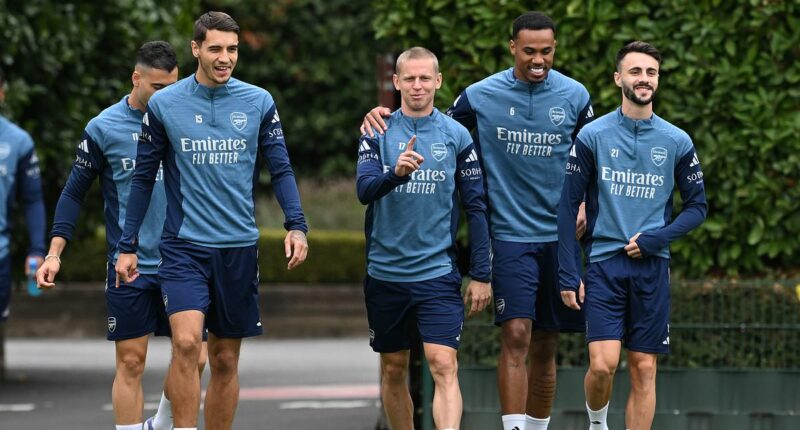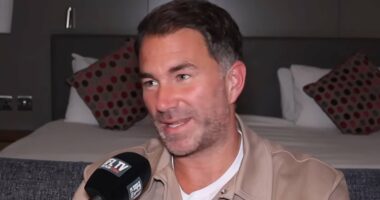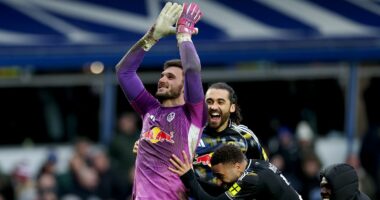Share this @internewscast.com
Arsenal’s transfer strategy has become a tale of two doors – one swinging wide open, the other stuck and barely budging.
Despite spending a hefty sum this summer—around £250 million on seven players, plus Piero Hincapie from Bayer Leverkusen on loan with a £45 million buy option—Arsenal faces a surprising reality.
Their top transfer sale remains Alex Oxlade-Chamberlain’s £35 million move to Liverpool in 2017, highlighting a pressing need to revamp their sales strategy.
Compared to other Premier League teams, this gap becomes evident, underscoring the need for financial sustainability if Arsenal hopes to maintain its spending power.
Over the past three seasons, Arsenal has brought in £152.5 million from player sales, a stark difference from Chelsea (£728 million), Liverpool (£334.9 million), and Manchester City (£400.6 million).

Alex Oxlade-Chamberlain’s £35m move to Liverpool in 2017 is still Arsenal’s record sale

Chelsea have shown Arsenal the way in terms of selling players – including Noni Madueke who moved to the Gunners this summer for an initial £48m
An analysis by Daily Mail Sport, which involved number crunching and expert consultations, reveals why Arsenal lags behind in developing and selling talent effectively, as well as their struggle to maximize transfer market returns.
The club’s profile shows missed chances, last-minute loans, and diminutions in player value, particularly when compared to Liverpool. Their main rivals are noted for the ‘Liverpool tax,’ a strategy where they maximize profits and secure strong deals for their players.
This nimbleness and acuity in transfer dealings has seen Liverpool pull in £288m in this window alone. This summer, the Gunners topped the Premier League net spend table (£245.1m), despite Liverpool spending £165m more than them. Chelsea spent £30m more than Arsenal, and still ended up with a £10m profit this summer thanks to vast sales.
It is a crucial part of modern football because of the threat of Profit and Sustainability Rules (PSR), which currently limits a club to losing a maximum of £105m over a three-year period or face sanctions.
From last weekend’s encounter between the two club’s, it looks like Arsenal still have something to learn from Liverpool – both on and off the pitch.
The vipers’ nest that is the premium football transfer market is not easy to navigate. All of Europe’s top clubs invariably look to offload those who are surplus to requirements for sizeable fees in a bid to reinvest in their squad.
At Arsenal this summer, just like in previous seasons, they have had to resort to loaning out unwanted players rather than selling them for healthy sums.
On deadline day, Arsenal shifted five players out of the door. They had a combined 334 Premier League appearances and 110 international caps to their name, but the only money coming back in this summer for them was a minimal £2.6m fee for Albert Sambi Lokonga to join Hamburg. Fabio Vieira, Reiss Nelson, Jakub Kiwior and Oleksandr Zinchenko all departed on loan – to Hamburg, Brentford, Porto and Nottingham Forest respectively.

Oleksandr Zinchenko (second left), Fabio Vieira (second right) and Jakub Kiwior (right) were part of a deadline-day exodus at Arsenal – but none have brought in a guaranteed fee

Arsenal recouped just £2.6m for Albert Sambi Lokonga, a Belgium international who they paid £17.5m for four years ago
Only Kiwior, who has a £23.5m option to buy in his deal, is likely to bring in any significant money. The values of these players, who Arsenal were so obviously keen to get rid of, has dwindled. Rather than selling at a peak, they have been let go on the cheap.
This is where Liverpool, Man City and Chelsea have outshone them this summer, with players sold for strong sums – including one of Arsenal’s signings, Noni Madueke (67 Premier League appearances, £52m from Chelsea). Then there’s Jarrell Quansah (30 league appearances, £35m from Liverpool to Bayer Leverkusen) and James McAtee (48 league appearances, £30m from Man City to Nottingham Forest).
In terms of summer sales overall, Arsenal (£8.5m) are way behind Chelsea (£301.8m) and Liverpool (£227.6m). Man City generated £100m. It’s a complex issue with a variety of reasons for their struggles.
A director of a rival club told Daily Mail Sport that Arsenal are victims of having historically vastly overpaid for players and held on to others for too long.
He cited the then-club record £72m paid for Nicolas Pepe in 2019 before departing on a free transfer four years later, and the £32m for Zinchenko – whose contract expires next summer, as the two clear examples of paying way over the odds.
The same director added that Nelson, Sambi Lokonga, Thomas Partey, Ainsley Maitland-Niles and Pierre-Emerick Aubameyang were all on a lengthy list of players he feels could have been sold much sooner at a far higher value.
He believes Arsenal’s sporting director, Andrea Berta, who has a background in banking, will be more mindful than his predecessor Edu of contracts running close to the final year.
Daily Mail Sport understands that at the start of the window, Arsenal were open to selling Gabriel Martinelli. However, they had valued him at more than £60m and interest in the winger was only reaching the £40m mark. This deterred the club from pushing to sell him, to avoid a long-running saga.
It follows an underwhelming couple of seasons after Martinelli struck 15 league goals and six assists in his breakthrough 2022-23 campaign.
As Daily Mail Sport referenced last Friday, this is the main area that has stopped the Gunners’ summer business under Berta from being perfect, having finally secured a striker in Viktor Gyokeres and taking Eberechi Eze from under Tottenham’s noses.

Pierre-Emerick Aubameyang was bombed out of the squad and had his contract cancelled rather than being sold, when he was Arsenal’s club captain and main striker

Arsenal’s £72m man Nicolas Pepe was allowed to leave on a free transfer – and scored against the Gunners for Villarreal in pre-season

Andrea Berta (left) and Mikel Arteta (right) had a brilliant transfer window on the arrivals front, bringing in the likes of Eberechi Eze (centre) for £67m
Additionally, there are those who believe one of Arsenal’s biggest problems is a failure to advertise their peripheral players.
One agent told Daily Mail Sport: ‘There are matches like the Carabao Cup, FA Cup, where you play players that are not the priority, but are in the project and you would sell for the right price. If you play them, you can sell them for quite a bit because you’re advertising them in the right markets.
‘Vieira and Lokonga did OK on loan. But Arsenal are reliant on them performing on loan rather than giving them game time at their club.
‘It’s about how you advertise them during the season. Often with players from other top clubs, you know the value he is bringing. Whereas with Arsenal, If they don’t sell him, he’s not going to play and that makes a difference.
‘Chelsea have a big squad but they manage to play all the players and interested parties will see a couple of the games and say, “He’s decent, let’s see what his situation is”.’
Mikel Arteta is keen for his best players to play as often as possible – understandable when they have Champions League games to play, whereas Chelsea’s large squad could be rotated in the Conference League last season.
But it may not have been necessary for the likes of Bukayo Saka, Kai Havertz and Thomas Partey to come off the bench when 2-0 up at Preston in the Carabao Cup fourth round last September. Saka also played 71 minutes of the 5-1 home win over Bolton in the previous round.
Agents also feel there is a whiff of desperation about Arsenal. The agent added: ‘If I know the club really want to get a player off the books, I’ll come towards the end of the window and put in an offer and say, “Take it or leave it”.

Bukayo Saka played 71 minutes of a Carabao Cup third round win over League One Bolton

Nicolas Anelka’s £25m move to Real Madrid 26 years ago is still Arsenal’s seventh-highest sale
‘They seem desperate to sell players. I’ll know that my offer might be the only one they (Arsenal) have and that they want to sell, so that gives me the upper hand.’
The international status of a player also has a strong influence on value and saleability. Man City, Chelsea and Liverpool all have stars who are not necessarily first-team starters, but are important figures for their national teams.
‘Look at Liverpool, they sold Darwin Nunez for £50m,’ the agent explained. ‘Nunez is the main striker for Uruguay, he has that presence and market value others don’t have. Without him, Uruguay would be short.
‘Apart from (Oleksandr) Zinchenko, who is an international for Ukraine, Vieira isn’t a Portugal starter, Lokonga isn’t for Belgium. When a player has that international CV, it elevates their value.
‘Even if you play Europa League, Europa Conference League, that puts you on a European stage and adds to your profile. As a club, you can say “Well, he played X games in this competition etc”.’
In this window, Arsenal are selling players at an older age who have already reached their career peak, or have little development left to run.
Zinchenko, at 28, and Nelson, Vieira, and Sambi Lokonga, all 25, are no longer young prospects.
That’s different to Chelsea, for example, who have invested in young stars who can be sold for a profit. Of the 23 players they have sold or sent out on loan this summer, only six are 25 years old or older – Christopher Nkunku, Ben Chilwell, Kiernan Dewsbury-Hall, Marcus Bettinelli, Kepa Arrizabalaga (to Arsenal), Joao Felix and Djordje Petrovic. They still recouped a combined £91m for that six.

Chelsea were able to sell 22-year-old Renato Veiga to Villarreal this summer for a £14m profit after just a year in west London

Chelsea cut ties with Carney Chukwuemeka, who they had spent £20m on, when Borussia Dortmund came in with a £24m bid this summer
A second agent told Daily Mail Sport: ‘Chelsea bought young players before they’ve hit their peak so there’s a chance they can appreciate in value. They are still investing a lot of money in players that are unproven.
‘Players that are surplus are naturally not going to be in demand. So it’s about investing before 21 years of age and then seeing their value increase.’
Over at Manchester City, they have benefitted from their City Football Group portfolio – which consists of 13 other clubs, including Girona, Palermo and New York City FC.
He added: ‘Man City have always had exit strategies across the world. They think, “We can create value by putting him in one of our other clubs”. There’s a value in being a City Group player, there’s a premium attached and that adds to their value.’
A source with knowledge of Arsenal’s strategy claims that it’s more complex than just getting good money for unwanted players.
They point to the rebuild that has been required under Arteta, who inherited an underperforming side and turned it into runners-up in three consecutive seasons.
The source told Daily Mail Sport: ‘Those players in the earlier years weren’t good enough and Arteta and Edu had to work out which players to get rid of. If you’re a team who finished 8th and 8th, you’re obviously not going to be able to sell players for good money.
‘Whereas teams that have consistently won the Premier League title have the best players and by default are able to attract larger interest and sums. Once a squad is winning trophies, you’re selling prime cuts of meat rather than cutting fat.’

Chelsea were able to move high earner Ben Chilwell to sister club Strasbourg on deadline day

Arsenal spent a combined £78m on Manchester City stars Gabriel Jesus and Oleksandr Zinchenko in 2022
On Chelsea, the source added: ‘Every other club is playing catch up to Chelsea. Arsenal is moving in the right direction and knows what steps must be taken to bridge that gap.’
They claim that the Gunners have looked at Chelsea’s model and are taking inspiration from it. Such seeds have already been sown. Just last summer, Arsenal sold academy graduates Emile Smith Rowe and Eddie Nketiah for initial fees of £27m and £25m respectively. That was pure profit from the sale of academy alumni. More of this can be expected.
Financially, Arsenal are healthy, regardless of their troubles in the sales department. And needing to recoup money from sales isn’t as pressing an issue for the Gunners because of the frugalness of Arsene Wenger during his managerial reign from 1996 to 2018. He stuck to a rigid wage structure and, even now, the north London club is relatively modest in its wage bill.
According to football wage tracking website Spotrac, last season Arsenal ranked fourth for annual wage bill (£185.9m) behind Man City (£243.9m), Chelsea (£196.9m) and Manchester United (£194.4m).
‘They were quite sensible at the start of the Premier League under Arsene Wenger where wages were kept relatively modest,’ said football finance expert Kieran Maguire. ‘Seven or eight years ago, they sort of had the purge of the ultra-high earners which has meant that their payroll now is very comfortable.
‘They could easily spend £150m and be fine in terms of PSR. They sold Emile Smith Rowe to Fulham last year, a former academy player, which is pure profit.
‘It’s an area they’ve got to address but even so, they’ve managed to shift players for what you would call modest sums to generate some money. The exit door is desirable but not essential.’
Their financial position allowed the club to recently sign Crystal Palace’s Eberechi Eze for £60m, plus £7.5m in add-ons, for example.

Emile Smith Rowe’s £27m initial fee when he joined Fulham last summer makes it into Arsenal’s top five for player sales

If the likes of Noni Madueke and Eze can get Arsenal into the Champions League latter stages, then the lack of incoming money from player sales will be less relevant
‘If Arsenal get, say, to the quarter-finals of the Champions League, they’re probably looking at £100m in terms of broadcast money and gate receipts,’ Maguire added.
‘So I think they will look at it (signing Eze) as an investment, which they will recoup, because they need a stronger squad if they want to be competitive for the for the big prizes, which are the Champions League and Premier League.’
Arsenal’s struggles in the selling market are evident. While their recruitment has reached new heights under Arteta and Berta, their outgoing strategy still needs refinement.
The club are financially healthy, and more competitive than they’ve been in years. But unlocking that exit door could be the key to making that final step and becoming champions.












